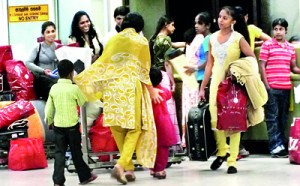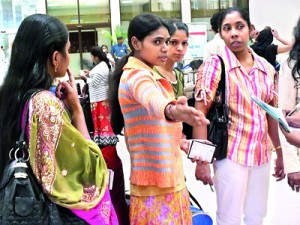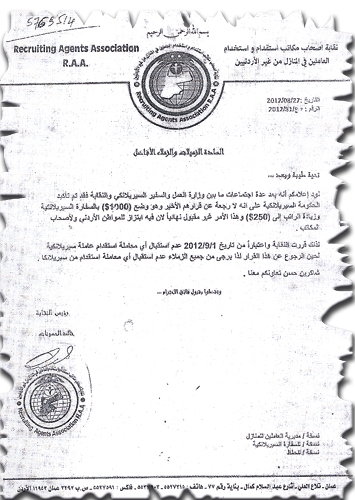Jailed Sri Lankan domestic workers held incommunicado in Jordanian prison

Returnees
‘Close the Sri Lankan Embassy in Jordan or replace its officials with better people as they are not sufficiently concerned for the safety and protection of Sri Lankan domestic workers in that country’. This was the angry plea by a group of 19 ‘runaway’ Si Lankan workers who arrived at the Katunayake airport in the wee hours of Tuesday morning, from Jordan.
In Jordan, they were arrested by the authorities, put in the jail and kept incommunicado for months – some for several years. In addition to several other Sri Lankan domestics held in a Jordanian prison, it is reported that there are more than 200, runaway housemaids crammed in a safe house in the Sri Lankan embassy premises.
On arrival at the airport on Tuesday, they were furious, angry and with grim faces most of them crying in despair after returning home empty handed. They were jailed after running away from their masters and for the offence of breaking that country’s immigration laws.As they were kept in the prisons incommunicado, they were accompanied to the Amman Airport straight from the prison. While a few NGOs were aware of their arrival, their relatives were unaware and some of them said that they must have been considered dead, by their Sri Lankan kith and kin, because there was no communication for months, sometimes years with relatives here. One worker said her husband was a labourer and she had worked in countries like Kuwait and Saudi Arabia on four occasions, each 2-year stints and on the fifth occasion came to Jordan. In earlier workplaces, her wage was around $200 while in Jordan it’s only about half that.
She accused her employer of attempting to sexually molest her on several times. Unable to resist his advances, she ran away and worked outside for seven months.
For six months she sent money at the rate of Rs 20,000 per month but eight months before being detained, she was unable to send any money. She had been detained for seven months.
Another said that because the pressure of work was very high she jumped from the balcony breaking her leg. She alleged that embassy people handed her over to the same employer and the assaults and torture multiplied thereafter. Another worker said that she was in Jordan for seven months and out of the seven months the employer has not paid her wage for four months. When she requested the salary she was severely beaten, no food was given and she was confined to a locked room for days. Blood oozed from her ears and she was deaf for some time. She ran away and worked outside for four months until she was caught and jailed for seven months. Police in that country were generally good, they said, adding that the embassy people were the worst lot and not helpful.

A group of Sri Lankan migrant workers returned this week following a harrowing experience in a Jordanian jail after running away from the homes of sponsors.
At the homes of sponsors, some were forced to work in several floors in houses and several houses sometimes as high as 10 floors and when they complain that it is humanly not possible to work in that way, they would be often severely beaten. Another five Sri Lankan domestics held in detention in Jordan arrived on Thursday in Colombo. F. Solomantine from the Consortium for Human Rights and Development (CHRSL), Sri Lanka told the Business Times that they too were helping in the process of repatriating these workers to Sri Lanka and have documented worst cases in detention.
He said that there are more than 200 domestic workers in the Sri Lankan Embassy in Jordan, in addition to those who are in jail. He said that there are reports that one of the detainees has died of TB. He said that CHRSL has requested a report from the Sri Lanka Foreign Employment Bureau on this matter and once they receive the report they would be conducting a national level inquiry to make recommendations to the relevant state authorities. Last week, the Sunday Times reported the repatriation of these workers saying their air fares have been paid for by Tamkeen, a legal aid organization in Jordan. Many migrant workers suffer under the ‘Kafala’ (sponsorship) system which prevails in most Arab states. Under this all unskilled labour must have an in-country sponsor, usually their employer, who is responsible for their visa and legal status.
This system has been condemned by human rights groups saying it exploits workers, as many employers take away passports and abuse their workers with little chance to legal action. In 2009, Bahrain became the first country to repeal this system.
Follow @timesonlinelk
comments powered by Disqus
















